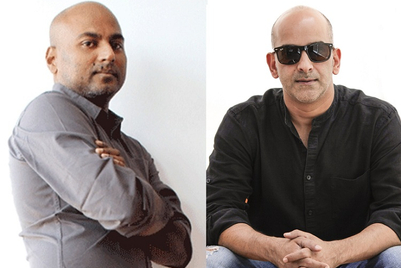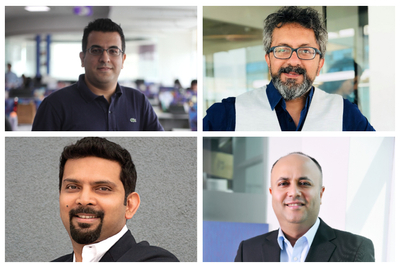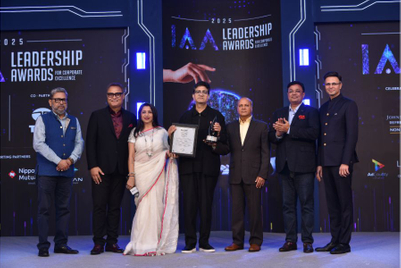
Anil Nair (L), CEO and managing partner, Law & Kenneth and Sagar Mahabaleshwarkar (R), national creative director, Bates CHI & Partners India
When a piece of ‘proactive’ work wins at an award show, does it result in the client becoming more open to ideas for mainstream work? What has been your experience?
Anil Nair (AN): The term proactive itself means that there is no brief, no client in many cases. It’s basically a skill. I don’t think that results in any client liking it. And many a time, clients don’t even get these ads, which are appreciated by the jury - the intelligent kind of work. If a kind of work creates major impact in the market, then clients are open to more such work. For example, ‘Har ek friend zaroori hota hai’ - it won. It’s not proactive but it won. The fact is that after that, every other client wanted ‘Har ek friend zaroori hota hai’. And when we did ‘Hum mein hai Hero’, every other client said, “Humko bhi kar de yaar, ‘Ham mein hai hero’.” So they are more interested in popular appreciation than jury appreciation.
Sagar Mahabaleshwarkar (SM): If you think of a proactive idea which has made difference to the business (or NGO), we should be implementing that work anyway. We should not send that work to awards first and after winning at Cannes, then you come to India and drive that work. Ideally you should be doing that work, implementing that and make sure it makes a difference to people’s lives.
I don’t have problem with proactive ideas, but I have problem with proactive ideas keeping only award shows in mind. I think the problem comes when you sell it. How do you sell that work to the client? Are you selling it keeping this in mind that you want to send the work across award shows and win metal? Then it’s a wrong objective. Who says no to great work? Which clients will say, ‘Don’t think of a good idea on my brand?’
Does an international award recognition lead to the campaign being adopted in other markets or inspiring work in other markets? Are there examples of the same?
AN: I can’t think of any example happened out of India, but I am sure there are awarded pieces of work, which get appreciated and therefore get picked up by all around saying something could work in their market. I really don’t know whether Shave Sutra got adopted across the globe but it won in Effectiveness and all that stuff in Cannes last year. I don’t know if Gillette has taken it across. But I am sure there are other examples. If you look internationally, I think Cadbury Eyebrows and Gorilla, after they won critical acclaim, many countries said they would want to release the work in their market too. If marketers believe this kind of work can work in their market then it’s an internal decision of clients than us. It has very little to do with the agency that was working on it.
SM: To be honest, I haven’t seen any of this. The Dove campaign - it really doesn’t matter if it has won Grand Prix or not, it is such a great campaign. I think that kind of campaign should go across all over the world. And I am sure keeping local norms in mind, they should try and take that campaign further. I don’t think with the Dove campaign they waited for Cannes’ approval or a Cannes Grand Prix or metal, to take that campaign into different countries. Awards functions come later; first brand then strategy then work happens and if the work is so kick ass, so good, then it also get recognised. Awards come later; Oscars happen later.
There is a view that ‘proactive’ work does not lead to sustained campaigns, but moves from one proactive campaign to another. Comment.
AN: The objective of the proactive work is not to have any other impact other than the impact on the jury and therefore to win awards. Once that is done, you don’t need to extend it, you just take the next one. So today it’s a fine art. There are two fine arts winning awards. One is the art of doing the work and second is the art of packaging it.
SM: I think somewhere down the line proactive work is sold in a wrong way for many, many years. Most of the time, I have heard people selling it saying “Yaar isko nikal de, isko awards ke liye nikalna hai”. Instead of saying this to the client, say you can take this idea, say this is how it is going to affect your business, or affect you as a brand. Then the client will also take it seriously.
Have clients become more welcoming of proactive work? What impact has the Goafest episode had on client perception of ad awards?
AN: On the contrary, clients are absolutely allergic to it right now. They are fearful of proactive work. After the Goafest episode, people are scared. Earlier they were indifferent, now they are allergic. I am talking about genuine clients - I am not talking about one-off clients, entrepreneurs, and newspapers like The Times of India, which has nothing to lose. Awards are way of recognition for The Times of India, so they will encourage that. It’s a win-win situation; I don’t find any harm in it.
SM: Smart clients always pick up the work which will make a difference to their business. And those are the clients who will not give permission to one-offs saying, “Let them do it quietly and no one should know about it.” If the idea is good, he will take up that idea and he will go all out to make sure that idea is implemented well and he will make a difference to it.
Awards are used as a measure of a creative person’s proficiency: True or false? If they are, should they be regulated more stringently?
AN: Unfortunately, the answer is yes. The network agencies have got to do this game. And there is great pressure on the creative fraternity within the agency to push the ranking up as a creative shop. So it is becoming that, but I believe that it could be the worst possible trend that is happening in our industry. Simply because the bread and butter of agencies comes out of doing work that helps clients grow their business.
Secondly, there are guys busting their backs, working night and day to do genuine work. You are sending absolutely wrong signals to them by actually rewarding or calling someone else more creative than them. By this you discourage the person or even make that person feel small and are creating a situation where the standard of genuine work keeps falling.
SM: There is a lot of work which is popular in India, which might not have won even at local awards. But still it is beautiful work. Awards are nice motivation for the fraternity, but it cannot be the only parameter of judging an individual. Somebody must be doing work on a really tough brand, which might not get recognition ever in his life. Does that mean he has not done good work? Amir Khan doesn’t believe in awards, does it mean he doesn’t do great films? For some other actors, winning Filmfare is everything. Good for them. As long as they are motivated and do good work, or better work or great work every year.
If a piece of work is good enough to win an award, is there a need to look at whether it is ‘proactive’ or done for a brief?
AN: Absolutely, no reason to look at it from where it has come. But you declare the awards as craft awards and not as advertising awards or call it the ‘Best campaign of the year’. It cannot be the best campaign if it is not done to a brief.
It’s so unfair. It is so difficult to get a campaign out today because you go through many yardsticks, many levels of approvals, many interactions, many people’s minds, there is a lot of hard work going into it. Most campaigns get relegated against a campaign which is created without a brief.
Declare these awards as nothing but craft awards and say by no benchmark does it reflect the best creative persons around.
There are giant aberrations like Wieden + Kennedy. My respect for that company W+K Boston and W+K London is very high. Every year they come and spit on the face of all the scamsters. My respect for Cannes is simply because a Wieden + Kennedy does win the Agency of the Year.
SM: A great idea is a great idea - as long as it makes difference to the client, meets marketing objectives, you sell it to clients with the right intent, and don’t think of that work keeping awards in mind, then there is no harm taking your proactive work to the client. To my mind, proactive work is like a sketch for creative people. I keep sketching everyday so that my drawings get better, my composition gets better. It’s practice. You think of proactive work, proactive idea; your mind is thinking constantly about your brand. If you’re working on a brand, you better think about the brand all the time - why are you waiting for a brief? If it’s a great idea, it should become your brief.
Are we more accepting of proactive work that wins at ad festivals abroad than ones that win in India?
AN: Yes of course. Scams go and win in awards and then we put out a headline, ‘India strikes Cannes’. And we spit all over it when locally if it wins some awards. Show me one genuine piece of work that won this year. The one genuine piece of work that won this year was not entered by their agency, was entered by their London office, Lowe’s work. The work on Lifebuoy, brilliant work. Lowe doesn’t create scam and they don’t enter awards. All awards that won at Cannes was not scam but large amount of work was prepared for awards only; it wasn’t prepared for the market. And also in the categories which is easy to do - like Print, Poster and Outdoor. Try doing it on TV, try doing it on Branded Content, try doing it in Integrated, try doing it on Mobile - you can’t.
SM: After these awards, I realise, yes. Many of us make a big noise about scam work. It looks like we are more open about international recognition of proactive work than recognition which happens in India. I think in India people make lot of noise on proactive work.
I am happy for the people who won, I am really happy India won so many metals. Everyone should just sit back and think whether that work was done with the right intention.
Awards are seen as morale boosters for the creative fraternity. Is this healthy?
AN: Not at all. What are we boosting? I’ll tell you genuinely, there will be a day when real creative guys will stand up and do real work, without any of this thing. We can’t legitimise a wrong thing by saying these are the morale boosters. Creative people need applause, an artiste needs applause. Great artistes of the world have engrossed audiences, cutting across culture, community and country.
Creativity is about truth. You can’t do this scam business - this is cheating, this is a lie. You create something and enter it, and then the whole process you go through, reeks of ingenuity. The great creative guys around the world - look at film makers. Look at the guys who are making films in India like Anurag Kashyap, Imtiaz Ali and Dibakar Banerjee. Do they do this? They genuinely sit there and put their bloody life at risk and make brilliant movies - watchable movies, which people like.
SM: It depends on age, how old you are in the industry, what motivates you. I always say, awards show are two and a half minutes of glory. If that two and a half minutes of glory excites you, motivates you, inspires you to do better work every year, by all means go ahead and do that kick ass work which motivates you. There are people like Amir Khan also in this industry without award show they do good work and there are agencies who stood for that and they are still doing good work in this country, and hats off to those people, who are doing good work, their brands are getting recognised, their brands are doing well, they are a very healthy agency and they have very happy people. My advice to all the youngster is don’t chase it for the sake of it. See what’s behind it - if it motivates you, by all mean take it, but play it in the right way. Otherwise everybody will suffer, our industry will suffer.


.jpg&h=334&w=500&q=100&v=20250320&c=1)
.jpg&h=334&w=500&q=100&v=20250320&c=1)

.jpg&h=334&w=500&q=100&v=20250320&c=1)



.jpg&h=334&w=500&q=100&v=20250320&c=1)


.png&h=268&w=401&q=100&v=20250320&c=1)


.png&h=268&w=401&q=100&v=20250320&c=1)

.jpg&h=268&w=401&q=100&v=20250320&c=1)


